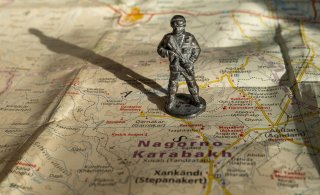Guiding Conflicting Factions Toward Addressing the Lachin Crisis
As tensions between Armenia and Azerbaijan flare up once again over the fate of Karabakh, temperate and reasoned discussion is required more than never.
The clash of narratives occasionally crosses boundaries, prompting Karabakhi Armenian activist Artur Osipyan to advocate for a more balanced stance when making claims about hunger. Osipyan points out the potential negative consequences of stretching the truth excessively, as falsehoods can erode their credibility. However, it's worth noting that Osipyan later clarified his statement, indicating that his initial words had been misunderstood and taken out of context.
Karabakh Is Not an Island with One Port
Nonetheless, the intention behind the aforementioned words is not to disregard the potential consequences of the ongoing deadlock on the ground. Rather, the aim is to propose a viable exit or solution to the international community, with the intention of assisting both sides involved.
Tensions run high in both Azerbaijan and Armenia. Oftentimes, choices and declarations are shaped with a keen focus on their respective domestic audiences. With the pivotal elections in Yerevan in September, Prime Minister Pashinyan is facing allegations of lacking firmness and not pursuing all possible avenues. Alarmingly, some voices are even shamelessly advocating for cynicism, going as far as suggesting the use of children and women as shields.
For Armenia and the local separatists, their foremost concern revolves around unhindered access via the Lachin road. Conversely, Azerbaijan asserts its rightful ownership of both Lachin and Karabakh—a status further acknowledged by Armenia’s prime minister. Consequently, Baku maintains that it holds the right to determine the routes and roads through which essential goods and supplies should be transported to the region. Despite Baku’s offer to extend aid and provisions through the Azerbaijani town of Aghdam, certain radical factions among the Karabakhi Armenians turned down this proposal. There are also notable figures who were dismissed from their positions, and they advocate for Karabakhi Armenians to engage immediately in sincere dialogue without the involvement of any mediators.
As Hikmet Hajiyev, the assistant to the president of Azerbaijan, recently emphasized, Armenia’s strong rejection of using the Aghdam Road while simultaneously insisting solely on retaining the Lachin Road is interpreted in Azerbaijan as an indication that Armenia’s intentions lean more towards pursuing the separatism of Karabakhi Armenians rather than their reintegration to Azerbaijan.
Azerbaijani officials draw parallels between the perspectives of U.S. officials on analogous instances involving separatist elements in Ukraine and Russia, juxtaposing these with the situation involving Karabakh separatists and Armenia. Notably, during a 2014 United Nations Security Council gathering, then-U.S. ambassador Samantha Power unequivocally stated that Russia had no legitimate basis for delivering assistance to Ukrainian separatists. Curiously, in the context of Karabakh, Ambassador Power advocates for Azerbaijan to unblock the Lachin Road for the delivery of aid to separatists. This divergent stance displayed by certain Western officials has been perceived by both the Azerbaijani government and its populace as a form of double standard, one that ultimately exacerbates the existing deadlock.
In fact, the way out from the artificial deadlock entails a decisive choice between prioritizing the reopening of the Lachin Road or emphasizing humanitarian considerations and exigencies.
Should the latter carry greater weight, then a straightforward solution emerges, rendering the ongoing crisis artificially prolonged. It is important to note that the Armenian populated territory in Karabakh is not an island, nor can it be solely reliant on the Lachin Road. The International Committee of the Red Cross, USAID, and other international humanitarian organizations possess the capability officially to address Azerbaijan to explore alternative routes, such as Aghdam, for the delivery of essential supplies to Karabakh, should the Lachin route remain an insurmountable obstacle.
Fuad Chiragov is Deputy Director of the Center for Studies of the South Caucasus (CSSC).
Image: Shutterstock.

